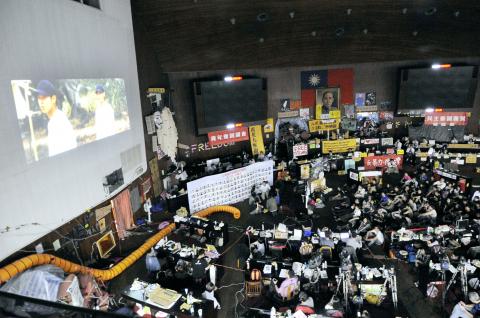Lights were dimmed to turn the occupied legislative chamber into a movie theater on Monday night, as the blockbuster Taiwanese film Kano was screened for the assembled students and media corps inside for an evening of entertainment.
The screening was a treat for the Sunflower movement protesters holed up inside the legislature, and was arranged with the approval of Wei Te-sheng (魏德聖), executive producer of the baseball movie set in the 1930s.
Kano, whose domestic box office receipts have already surpassed NT$250 million (US$8.23 million), is based on the true story of a high-school baseball team from Chiayi City overcoming the odds to reach the 1931 final of Japan’s prestigious Koshien high-school baseball championship, held annually in Osaka.

Photo: Chen Chih-chu, Taipei Times
It has made history by becoming the first full-length feature film on the commercial circuit given a screening inside the legislature.
Wei, Taiwan’s leading movie director and producer, threw his support behind the Sunflower movement, while the students, who were into the 14th day of their siege of the legislature, said watching Kano was a much-needed respite and morale booster for them.
A spokesperson for Wei’s ARS Film Production Co said: “The students initiated contact with us. We decided to give the go-ahead for the movie screening inside the legislature. It was our way of showing support, because we understood that many students were worn out mentally and physically after what they went through in the past weeks.”
The screening began at 8:30pm on Monday evening, with several hundred students and media representatives on hand to watch the three-hour-long feature film.
After the rally in Taipei on Sunday, Wei was moved to write a letter to the students, which was read aloud for the audience inside the legislature before the screening.
In the letter, Wei lauded the courage of the students in their action “in defense of our democracy.”
He also asked: “For the cross-strait service trade pact, can we not go back and restart the negotiations from the beginning?”
“That night, when students broke down the doors to the legislature, I felt such shock and intense emotions as I had never experienced before. It was not the use of force by students, but because my heart deeply felt it was the start of an awakening movement of people defending Taiwan,” Wei wrote.
“The government should not ask the students when the protest will end, but should ask them to help solve problems,” he added.
“I truly wish that in future years I can still listen to songs and music belonging to Taiwan, to tell stories about Taiwan and to smell the aroma from the land of Taiwan,” Wei wrote at the end of the letter.
“I want to thank this group of students who are defending Taiwan’s democracy. It is because of them that I have seen the beauty and goodness of Taiwan,” Wei said.

The manufacture of the remaining 28 M1A2T Abrams tanks Taiwan purchased from the US has recently been completed, and they are expected to be delivered within the next one to two months, a source said yesterday. The Ministry of National Defense is arranging cargo ships to transport the tanks to Taiwan as soon as possible, said the source, who is familiar with the matter. The estimated arrival time ranges from late this month to early next month, the source said. The 28 Abrams tanks make up the third and final batch of a total of 108 tanks, valued at about NT$40.5 billion

Two Taiwanese prosecutors were questioned by Chinese security personnel at their hotel during a trip to China’s Henan Province this month, the Mainland Affairs Council (MAC) said yesterday. The officers had personal information on the prosecutors, including “when they were assigned to their posts, their work locations and job titles,” MAC Deputy Minister and spokesman Liang Wen-chieh (梁文傑) said. On top of asking about their agencies and positions, the officers also questioned the prosecutors about the Cross-Strait Joint Crime-Fighting and Judicial Mutual Assistance Agreement, a pact that serves as the framework for Taiwan-China cooperation on combating crime and providing judicial assistance, Liang

A group from the Taiwanese Designers in Australia association yesterday represented Taiwan at the Midsumma Pride March in Melbourne. The march, held in the St. Kilda suburb, is the city’s largest LGBTQIA+ parade and the flagship event of the annual Midsumma Festival. It attracted more than 45,000 spectators who supported the 400 groups and 10,000 marchers that participated this year, the association said. Taiwanese Designers said they organized a team to march for Taiwan this year, joining politicians, government agencies, professionals and community organizations in showing support for LGBTQIA+ people and diverse communities. As the first country in Asia to legalize same-sex

MOTIVES QUESTIONED The PLA considers Xi’s policies toward Taiwan to be driven by personal considerations rather than military assessment, the Epoch Times reports Chinese President Xi Jinping’s (習近平) latest purge of the Chinese People’s Liberation Army (PLA) leadership might have been prompted by the military’s opposition to plans of invading Taiwan, the Epoch Times said. The Chinese military opposes waging war against Taiwan by a large consensus, putting it at odds with Xi’s vision, the Falun Gong-affiliated daily said in a report on Thursday, citing anonymous sources with insight into the PLA’s inner workings. The opposition is not the opinion of a few generals, but a widely shared view among the PLA cadre, the Epoch Times cited them as saying. “Chinese forces know full well that